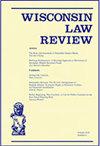Educating Lawyers for Community
IF 0.7
4区 社会学
Q2 LAW
引用次数: 1
Abstract
This Essay addresses the education of lawyers for community. For twenty-five years I have taught within an academic and practice community of lawyers, clients, judges, scholars, and more recently church ministers and their congregations. Throughout these years, the form and substance of community have changed. For most, the form of a community is discernible despite variation in the demographic status and identity of its membership, or the geography and physical space of its assembly. For others, the substance of a community is elusive, its experience of belonging complex and its intrinsic meaning multifaceted. To many lawyers and legal scholars, the substantive meaning of an engaged community, a community where you have to go together, derives in part from individual and collective efforts to fulfill a core normative responsibility of the legal profession, namely to stand as “a public citizen having special responsibility for the quality of justice.” Under American Bar Association and state ethics rules, that special civic responsibility should guide lawyer performance of the professional functions of representation in advocacy, counseling, and negotiation. The purpose of this Essay is to explore the teaching or pedagogy of community and public citizenship in legal education and professional training. Part of an ongoing classroom study and clinical service project encompassing the education of law students and the continuing training of lawyers, the Essay seeks to integrate several fields of scholarship, notably ethics, education and psychology, law and religion, and the lawyering process. Bracketed by these overlapping fields, the Essay proceeds in four parts. Part I constructs the pedagogy of community and public citizenship from legal and theological materials on mindfulness and spirituality. Part II locates the pedagogy of community and public citizenship in an outcome-based, rotation curricular model of legal education. Part III assesses the pedagogy of community and public citizenship in terms of conventional notions of lawyer role and function in the adversary system. Part IV evaluates the functional compatibility of the pedagogy of community and public citizenship with the curricular form and content of contemporary legal education.为社区教育律师
本文论述了社区律师教育的问题。25年来,我在一个由律师、客户、法官、学者以及最近的教会牧师和他们的会众组成的学术和实践团体中任教。这些年来,社区的形式和实质发生了变化。对大多数人来说,尽管其成员的人口状况和身份不同,或其集会的地理和物理空间不同,但社区的形式是可以辨认的。对其他人来说,一个社区的实质是难以捉摸的,它的归属体验是复杂的,它的内在意义是多方面的。对许多律师和法律学者来说,一个参与型社区的实质意义,一个你必须一起去的社区,部分源于个人和集体的努力,以履行法律职业的核心规范责任,即作为“对司法质量负有特殊责任的公共公民”。根据美国律师协会和州道德规则,这种特殊的公民责任应该指导律师在辩护、咨询和谈判中履行代表的专业职能。本文的目的是探讨社区和公共公民在法律教育和专业培训中的教学或教学法。作为一项正在进行的课堂学习和临床服务项目的一部分,该项目包括法律学生的教育和律师的继续培训,该论文旨在整合几个学术领域,特别是伦理学,教育和心理学,法律和宗教,以及律师程序。在这些重叠的领域中,本文分为四个部分进行。第一部分从关于正念和灵性的法律和神学材料出发,构建社区和公共公民的教育学。第二部分将社区和公共公民的教学法置于基于结果的法律教育轮转课程模式中。第三部分根据传统观念对律师在对抗制度中的角色和功能进行了社区和公共公民教育的评估。第四部分评估了社区和公共公民教育学与当代法律教育课程形式和内容的功能兼容性。
本文章由计算机程序翻译,如有差异,请以英文原文为准。
求助全文
约1分钟内获得全文
求助全文
来源期刊

Wisconsin Law Review
Social Sciences-Law
CiteScore
1.00
自引率
16.70%
发文量
0
期刊介绍:
The Wisconsin Law Review is a student-run journal of legal analysis and commentary that is used by professors, judges, practitioners, and others researching contemporary legal topics. The Wisconsin Law Review, which is published six times each year, includes professional and student articles, with content spanning local, state, national, and international topics. In addition to publishing the print journal, the Wisconsin Law Review publishes the Wisconsin Law Review Forward and sponsors an annual symposium at which leading scholars debate a significant issue in contemporary law.
 求助内容:
求助内容: 应助结果提醒方式:
应助结果提醒方式:


